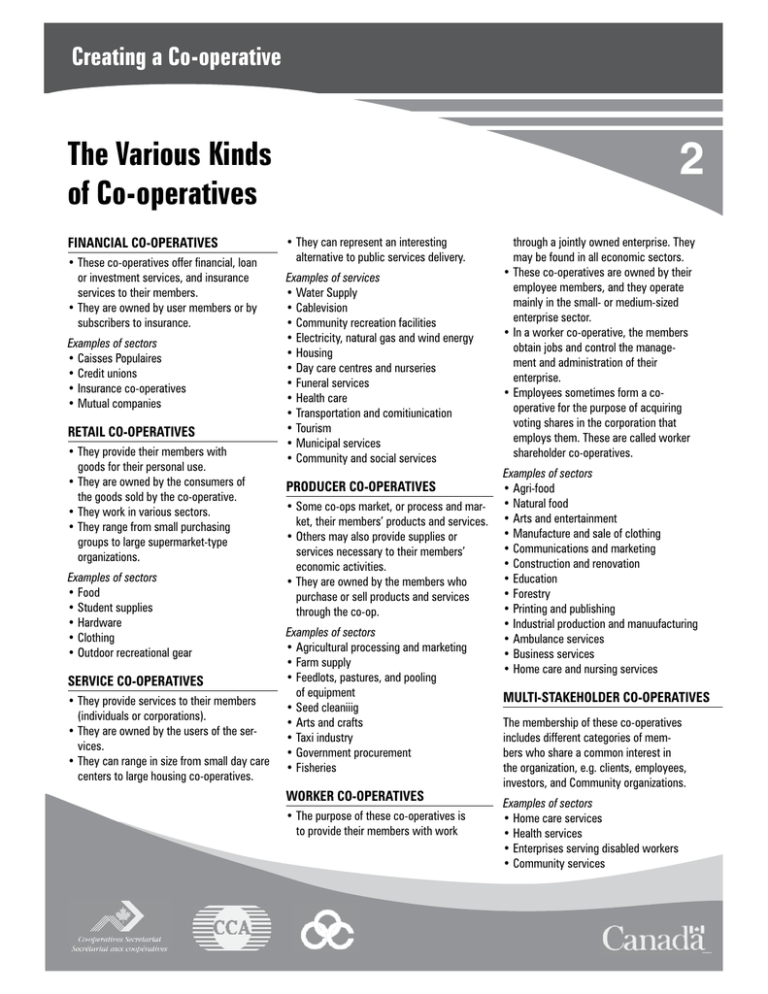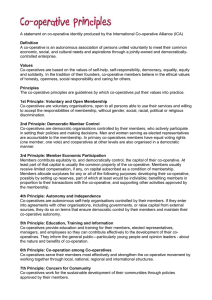The Various Kinds of Co-operatives
advertisement

Creating a Co-operative 2 The Various Kinds of Co-operatives FINANCIAL CO-OPERATIVES • These co-operatives offer financial, loan or investment services, and insurance services to their members. • They are owned by user members or by subscribers to insurance. Examples of sectors •Caisses Populaires •Credit unions •Insurance co-operatives •Mutual companies RETAIL CO-OPERATIVES • They provide their members with goods for their personal use. •They are owned by the consumers of the goods sold by the co-operative. •They work in various sectors. • They range from small purchasing groups to large supermarket-type organizations. Examples of sectors •Food •Student supplies •Hardware •Clothing •Outdoor recreational gear SERVICE CO-OPERATIVES • They provide services to their members (individuals or corporations). • They are owned by the users of the services. • They can range in size from small day care centers to large housing co-operatives. •They can represent an interesting alternative to public services delivery. Examples of services •Water Supply •Cablevision •Community recreation facilities •Electricity, natural gas and wind energy •Housing •Day care centres and nurseries •Funeral services •Health care •Transportation and comitiunication • Tourism •Municipal services •Community and social services PRODUCER CO-OPERATIVES •Some co-ops market, or process and market, their members’ products and services. •Others may also provide supplies or services necessary to their members’ economic activities. • They are owned by the members who purchase or sell products and services through the co-op. Examples of sectors •Agricultural processing and marketing •Farm supply •Feedlots, pastures, and pooling of equipment •Seed cleaniiig •Arts and crafts • Taxi industry •Government procurement •Fisheries WORKER CO-OPERATIVES •The purpose of these co-operatives is to provide their members with work through a jointly owned enterprise. They may be found in all economic sectors. • These co-operatives are owned by their employee members, and they operate mainly in the small- or medium-sized enterprise sector. •In a worker co-operative, the members obtain jobs and control the management and administration of their enterprise. •Employees sometimes form a cooperative for the purpose of acquiring voting shares in the corporation that employs them. These are called worker shareholder co-operatives. Examples of sectors • Agri-food • Natural food • Arts and entertainment • Manufacture and sale of clothing • Communications and marketing • Construction and renovation • Education • Forestry • Printing and publishing • Industrial production and manuufacturing • Ambulance services •Business services •Home care and nursing services MULTI-STAKEHOLDER CO-OPERATIVES The membership of these co-operatives includes different categories of members who share a common interest in the organization, e.g. clients, employees, investors, and Community organizations. Examples of sectors • Home care services • Health services • Enterprises serving disabled workers • Community services








